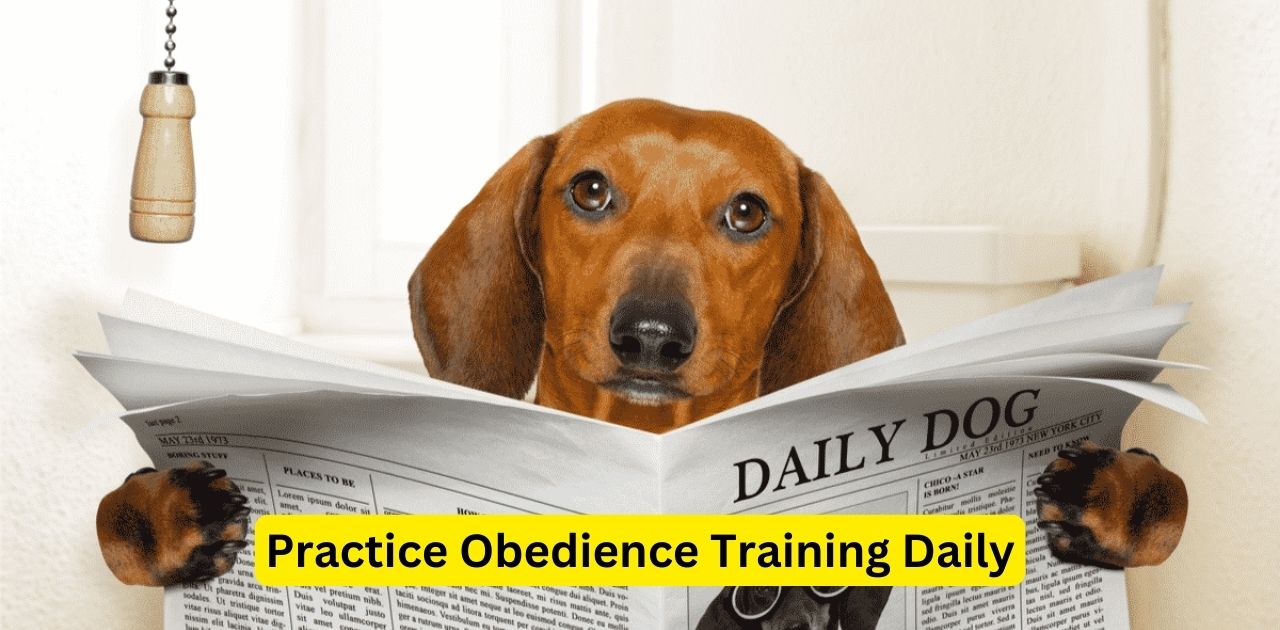Dachshunds are notoriously stubborn dogs that can be difficult to train and discipline. Their independent nature combined with their tendency to be manipulative can make dachshund puppy training a real challenge for even experienced dog owners. However, with the right approach and techniques, you can teach your wiener dog to be obedient and well-mannered. This comprehensive guide will provide you with the most effective strategies for disciplining your dachshund and curbing unwanted behaviors.
Understanding Dachshund Personality Traits
The key to successfully disciplining your dachshund starts with understanding the breed’s unique personality traits. Here are some of the key characteristics that make dachshunds more difficult to train:
- Independent – Dachshunds are independent thinkers who like doing things their own way. They are not eager-to-please dogs.
- Stubborn – Dachshunds are known for their stubborn streak. They can be manipulative and test boundaries.
- Strong-willed – With their big personalities, dachshunds can be very determined when they want something.
- Motivated by food – Dachshunds love treats and can be highly food motivated. Use this to your advantage in training.
- Easily bored – Dachshunds bore easily and have short attention spans. Keep training sessions short and engaging.
- Distracted – They are easily distracted by smells and sights when outside. Stay focused on training.
- Diggers – Allow your dachshund an outlet for this in-born trait to avoid destructive digging.
Knowing these breed-specific tendencies will help you have realistic expectations when it comes to disciplining your dachshund. Patience, consistency and creative positive reinforcement methods are key.
Start Training And Socialization Early
Like all dogs, dachshunds benefit enormously from early socialization and training. Starting as a puppy sets them up for success by teaching good manners and discipline from the very beginning. Be sure to:
- Enroll in puppy kindergarten and training classes. This socializes them to be comfortable around other dogs and people.
- Use reward-based methods right away. Dachshunds respond best to positive reinforcement training techniques.
- Handfeed puppy kibble during this early period. This builds your bond and establishes you as the leader.
- Introduce handling, grooming and veterinary exams. Get them comfortable with being touched from day one.
- Expose puppy to new sights, sounds, places, people. These early experiences are invaluable for preventing fear and anxiety issues.
- Avoid physical punishment or scolding. This can cause distrust and worsen stubborn tendencies in dachshunds.
The time and effort invested in proper early socialization and training sets up good behaviors that will make disciplining your dachshund much easier as they mature.
Use Positive Reinforcement Techniques
Dachshunds are sensitive dogs that will shut down or behave stubbornly if subjected to harsh discipline methods. Yelling, scolding, physical punishment will be counterproductive and likely make behaviors worse. For best results, focus on positive reinforcement training techniques such as:
- Food rewards. Dachshunds are very treat motivated. Use small tasty treats to reinforce desired behaviors.
- Verbal praise. Couple treats with enthusiastic praise to let your dachshund know when they are doing the right thing.
- Affection. Many dachshunds love belly rubs, pats and hugs. Use these as rewards too.
- Favorite toys. Let your dachshund play with a treasured toy as a reward for good behavior.
- Clicker training. The clicker precisely marks correct behaviors then treats immediately follow. This is very effective for dachshunds.
- Avoid physical punishment. Never hit, yell at or physically discipline a dachshund. This erodes trust and exacerbates stubborn tendencies.
With loads of patience and creativity, you can reinforce the good behaviors you want to see in your dachshund using positive methods they respond well to.
Set Rules And Structure In The Home
Dachshunds thrive when there is a predictable daily routine and consistent household rules. Setting and enforcing structure is just as important as formal training sessions. Be sure to:
- Establish a consistent daily schedule for feeding, potty breaks, walks, training sessions and playtime. Routines make dogs feel secure.
- Set house rules like no getting on furniture or begging at the table. Having limits helps reinforce you are the leader.
- Use crates when you are away from home. This prevents destruction, accidents and reinforces good potty habits.
- Designate dog free zones like bedrooms. Teach them to settle in their own bed/crate when relaxed times at home.
- Ignore attention seeking behaviors like barking or jumping up. Only give attention when they are calm.
Having clear rules and routines prevents many discipline problems from developing in the first place. Dachshunds appreciate structure and boundaries.
Redirect Unwanted Behaviors
Dachshunds are prone to several undesirable behaviors you’ll need to curb like barking, digging, jumping up, nipping, etc. Rather than scolding or punishing these behaviors, quickly redirect your dachshund’s energy into an approved activity:
- Barking – Redirect by asking for a trick like ‘sit’ then praise and reward for compliance.
- Jumping – Turn away and ignore your dachshund until they have four paws on the floor again. Then praise.
- Nipping – Say “No bite” then stuff a toy in their mouth instead to discourage nipping hands and feet.
- Digging – Provide a designated “dig box” filled with sand or dirt to satisfy this urge in an approved spot.
- Stealing food – Trade the stolen item for a high value treat. Then reward for “leave it” by not stealing again.
- Chewing – Provide plenty of tough, safe chew toys to satisfy this need. Use bitter apple spray deterrent on furniture.
Redirecting unwanted behaviors prevents the need for harsh discipline while steering your dachshund’s exuberance in the right direction.
Use Aversives Sparingly And Appropriately
While positive reinforcement should be the main focus, certain aversive techniques have their place in dachshund discipline provided they are applied correctly. This includes:
- Verbal corrections like a firm “No” or “Eh-eh”. Say in a deep tone without yelling then redirect.
- Spray bottles/compressed air. A light mist of water or burst of air surprises without harming your dachshund. Use for deterring unwanted behaviors like kitchen counter surfing.
- Bitter apple spray. The unpleasant taste teaches dachshunds to avoid chewing certain items. Reapply regularly.
- Time outs. Place your dachshund briefly in a boring room alone to calm down after inappropriate behavior. Use very sparingly.
Aversives function best as deterrents from unwanted behaviors. Always couple with redirection and never use for normal dog behaviors like digging, chewing or barking. Harsh physical punishment can make behavior issues worse in sensitive dachshunds.
Practice Obedience Training Daily

Formal obedience training should be an integral part of disciplining your dachshund. Daily 5-10 minute practice sessions reinforce your authority and strengthen your bond. Helpful commands to practice include:
- Watch me – Establishes direct eye contact and focus on you.
- Sit/Stay – Teaches impulse control. Increase duration gradually.
- Down/Stay – Calms over-excited behaviors. Work up to long down stays.
- Leave it – Prevents stealing food, chasing animals, etc.
- Come – Critical recall command for safety. Generously reward prompt recalls.
- Heel – Keeps your dachshund focused on you during walks instead of darting off.
Make sure your dachshund has mastered basic commands before moving on to more advanced skills. Keep sessions frequent but short to accommodate their brief attention spans. Consistent obedience work is hugely helpful for maintaining discipline in stubborn dachshunds.
Troubleshoot Specific Behavior Problems
Some problematic dachshund behaviors require targeted troubleshooting strategies. Here is how to discipline common issues:
Excessive Barking
- Determine trigger then desensitize through gradual exposure.
- Teach ‘quiet’ command and reward when obeyed.
- Reduce boredom with walks, playtime, chew toys.
- Discourage demand barking for attention.
Aggression Towards Other Dogs
- Socialize extensively starting as a puppy.
- Use positive reinforcement to teach calm behavior around other dogs.
- Don’t force interactions. Slowly desensitize under threshold.
- Consider professional training help for serious cases.
Resource Guarding Possessiveness
- Trade high value treats for stolen items to teach “give”.
- Hand feed meals to establish you as provider.
- Avoid scolding or grabbing away items. This increases possessiveness.
Separation Anxiety
- Use enrichment toys like food puzzles when leaving.
- Avoid emotional departures and greetings.
- Start with very short departures and slowly increase.
- Seek medication if anxiety is severe.
Digging
- Provide approved digging pit outdoors.
- Block access to landscaping using fencing or rocks.
- Keep dachshunds indoors when unsupervised in the yard.
- Try deterrent sprays on targeted digging sites.
Housetraining Lapses
- Stick to a strict daily potty schedule.
- Limit access before housetraining is complete. Use crates and pens.
- Thoroughly clean all accident sites with enzymatic cleaner.
- Watch for sniffing, circling and take out immediately.
- Praise and reward all outdoor potties.
By identifying the specific behavior behind issues, you can tailor discipline strategies to address the root cause. Seek professional advice for serious behavior problems or aggression.
Be Patient And Consistent
Successfully disciplining a strong-willed dachshund requires copious patience and complete consistency. It takes time and daily effort to influence their stubborn nature and independent streak. Here are some key tips:
- Have realistic expectations for the breed. Some behaviors like barking and digging are hardwired.
- Accentuate and reward the positive. Don’t dwell on the negatives.
- Stick to the same rules, routines and training cues. Mixed messages confuse dachshunds.
- Make sure all family members enforce rules consistently.
- Be calm yet firm when disciplining. Never get angry or frustrated.
- End each session on a good note with praise.
- Persist even when progress seems slow. These are determined dogs.
With a patient, positive and consistent approach, you can discipline and train your headstrong dachshund. Celebrate small improvements and lean on professional help if needed. Those stubborn wiener dogs are worth the effort.
FAQ’s For How To Discipline A Dachshund?
How do I get my Dachshund to listen?
- Positive reinforcement is key. Reward good behavior with treats, praise, or playtime. This builds trust and motivates your Dachshund to learn.
- Keep training sessions short and fun. Dachshunds have short attention spans, so 5-10 minute sessions several times a day are more effective than long, drawn-out training.
- Be consistent and patient. It takes time and repetition for any dog to learn new commands. Stay calm and consistent with your training methods, and avoid harsh punishments.
- Use clear and concise commands. Say your commands in a firm but friendly voice, avoiding repetition or shouting.
- Make it relevant! Focus on training commands that are useful in everyday life, like “sit,” “stay,” “come,” and “heel.”
How do you train a stubborn Dachshund?
- Address the root cause. Dachshunds can be stubborn if they’re bored, anxious, or lacking exercise. Ensure they get enough physical and mental stimulation through walks, playtime, and training.
- Increase the challenge. Make training more engaging by incorporating tricks, agility courses, or scent work. This keeps them mentally stimulated and motivated.
- Consider professional help. If you’re struggling on your own, consider consulting a certified dog trainer for personalized guidance and techniques.
How do I stop my Dachshund from being aggressive?
- Early socialization is crucial! Expose your Dachshund to different people, dogs, and environments from a young age to build confidence and prevent fear-based aggression.
- Identify triggers. What situations or stimuli make your Dachshund aggressive? Once you know the triggers, you can avoid them or desensitize your Dachshund to them gradually.
- Seek professional help. Aggression can be a complex issue, and a professional trainer can help you understand the behavior and develop safe and effective strategies for managing it.
Are Dachshunds misbehaved?
No, Dachshunds are not inherently misbehaved. Like any breed, their behavior depends on several factors, including genetics, upbringing, training, and socialization. With proper care, training, and understanding, Dachshunds can be wonderful companions.
Conclusion For How To Discipline A Dachshund?
Dachshunds present some unique discipline and training challenges thanks to their independent, stubborn personality. However, armed with the right strategies rooted in positive reinforcement, even these strong-willed dogs can become well-mannered companions.
The key is to start early with socialization and training, set clear household rules and structure, redirect unwanted behaviors appropriately, troubleshoot specific issues and persist with calm patience and consistency. While it takes work, the rewards of a well-trained dachshund are well worth the effort. With time and persistence, you’ll have a happy, obedient wiener dog that is a pleasure to live with.










